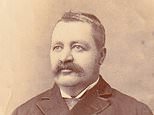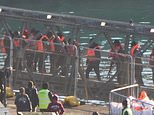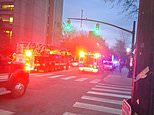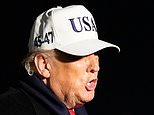
An exceptional posthumous Victoria Cross awarded to First World War sailor who was dubbed the ‘Pirate of Basra’ has sold for £200,000.
Lieutenant-Commander Charles Henry Cowley took part in a suicidal mission to reinforce the besieged Kut garrison in Mesopotamia, now Iraq, in April 1916.
They were carrying 270 tons of supplies in the SS Julnar, a river steamer, when they were attacked by Turkish machine guns and artillery.
Lieutenant-Commmander Cowley’s crew fought valiantly in the face of insurmountable odds until all 15 of them were killed or captured.
The 44-year-old river pilot and secret agent helped evacuate British nationals from Baghdad and also carried troops back and forth on the Euphrates and Tigris at great personal risk for 18 months.
This led to him receiving a death sentence in absentia by the Turks, who described him as a ‘pirate’, prompting Lieutenant-Commander Cowley to fly the skull and cross-bones flag.
Finally having got their man, the Turks swiftly executed Lieutenant-Commander Cowley, who posthumously received Britain’s highest award for gallantry.
The soldier was born in Baghdad but educated in Liverpool before joining the training ship Worcester as a cadet in 1885.
An exceptional posthumous Victoria Cross awarded to the ‘Pirate of Basra’ has sold for £200,000. Lieutenant-Commander Charles Henry Cowley took part in a suicidal mission to reinforce the beseiged Kut garrison in Mesopotamia, now Iraq , in the First Word War
The Victoria Cross that was awarded to Lieutenant-Commander Charles Henry Cowley
When his father died suddenly in 1889, he returned to Baghdad to live with his mother and quickly learnt Arabic and adopted local customs, like an early day Lawrence of Arabia.
In August 1914, he was in command of the steamer Mejidieh, which was ordered from Basra to Baghdad to evacuate British nationals.
Over the next year and a half, he carried out increasingly daring missions until his final stand on the night of April 24-25, 1916.
His Victoria Cross citation reads: ‘On the night of 24/25 April 1916 in Mesopotamia, an attempt was made to reprovision the force besieged at Kut-el-Amara.
‘Lieutenant Commander Cowley, with a lieutenant, a sub-lieutenant and 12 ratings, started off with 270 tons of stores up the River Tigris.
Lieutenant-Commmander Cowley’s crew fought valiantly in the face of insurmountable odds until all 15 of them were killed or captured in April 1916
‘Unfortunately Julnar was attacked almost at once by Turkish machine-guns and artillery.
‘At Magasis, steel hawsers stretched across the river halted the expedition, the enemy opened fire at point-blank range and Julnar’s bridge was smashed.
‘Julnar’s commander was killed, also several of his crew; Lieutenant-Commander Cowley was taken prisoner with the other survivors and almost certainly executed by the Turks.’
His medal, which emerged from the collection of the late Jason Pilalas, went under the hammer at London-based auctioneers Noonans, of Mayfair.
It was bought by a British private collector of gallantry awards.
Lieutenant-Commander Charles Henry Cowley’s Victoria Cross
A scroll presented to Lieutenant-Commander Charles Henry Cowley
The river steamer SS Julnar. It was carrying 270 tons of supplies when it was attacked
Nimrod Dix, deputy chairman of Noonans, said: ‘Cowley, had been born in Baghdad, and served on steamships up and down the Tigris and Euphrates rivers pre-hostilities, like his Irish-born father who did a similar job.
‘Cowley Jnr mastered Arabic and made many local friends, so was ideally suited to serve as a river-pilot, interpreter, and intelligence agent for the British.
‘Therefore, it was a small wonder then that his Turkish captors murdered him after he was taken prisoner in a suicidal attempt to reinforce the Kut garrison in the Julnar, that had been carrying 270 tons of supplies, in April 1916.
‘Eighteen months before he was murdered, Cowley was in command of the Mejidieh, and ordered from Basra to Baghdad to evacuate all British nationals who wished to leave.
‘His command having then been formally requisitioned by the Royal Navy, he went on to play a critical role in carrying troops back and forth on the Euphrates and Tigris.
‘His work came to the attention of the Turks, who sentenced him to death in absentia at a military court hearing held in Baghdad – and even sent him a message declaring him to be a ‘pirate’.
‘Such accusations appealed to Cowley’s sense of humour and, far from being perturbed, he took to flying the skull and cross-bones’ flag whenever he returned to Basra.’







